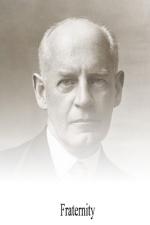In pursuance of this thought, she lunched hastily, and went out, making her way to Hilary’s. With every step she became more uncertain. The fear of meddling too much, of not meddling enough, of seeming meddlesome; timidity at touching anything so awkward; distrust, even ignorance, of her sister’s character, which was like, yet so very unlike, her own; a real itch to get the matter settled, so that nothing whatever should come of it—all this she felt. She hurried, dawdled, finished the adventure almost at a run, then told the servant not to announce her. The vision of Bianca’s eyes, while she listened to this tale, was suddenly too much for Cecilia. She decided to pay a visit to her father first.
Mr. Stone was writing, attired in his working dress—a thick brown woollen gown, revealing his thin neck above the line of a blue shirt, and tightly gathered round the waist with tasselled cord; the lower portions of grey trousers were visible above woollen-slippered feet. His hair straggled over his thin long ears. The window, wide open, admitted an east wind; there was no fire. Cecilia shivered.
“Come in quickly,” said Mr. Stone. Turning to a big high desk of stained deal which occupied the middle of one wall, he began methodically to place the inkstand, a heavy paper-knife, a book, and stones of several sizes, on his guttering sheets of manuscript.
Cecilia looked about her; she had not been inside her father’s room for several months. There was nothing in it but that desk, a camp bed in the far corner (with blankets, but no sheets), a folding washstand, and a narrow bookcase, the books in which Cecilia unconsciously told off on the fingers of her memory. They never varied. On the top shelf the Bible and the works of Plautus and Diderot; on the second from the top the plays of Shakespeare in a blue edition; on the third from the bottom Don Quixote, in four volumes, covered with brown paper; a green Milton; the “Comedies of Aristophanes”; a leather book, partially burned, comparing the philosophy of Epicurus with the philosophy of Spinoza; and in a yellow binding Mark Twain’s “Huckleberry Finn.” On the second from the bottom was lighter literature: “The Iliad”; a “Life of Francis of Assisi”; Speke’s “Discovery of the Sources of the Nile”; the “Pickwick Papers”; “Mr. Midshipman Easy”; The Verses of Theocritus, in a very old translation; Renan’s “Life of Christ”; and the “Autobiography of Benvenuto Cellini.” The bottom shelf of all was full of books on natural science.
The walls were whitewashed, and, as Cecilia knew, came off on anybody who leaned against them. The floor was stained, and had no carpet. There was a little gas cooking-stove, with cooking things ranged on it; a small bare table; and one large cupboard. No draperies, no pictures, no ornaments of any kind; but by the window an ancient golden leather chair. Cecilia could never bear to sit in that oasis; its colour in this wilderness was too precious to her spirit.




